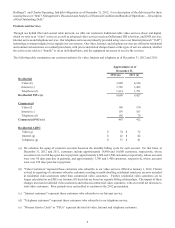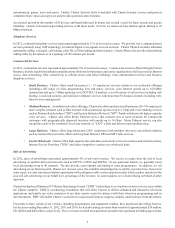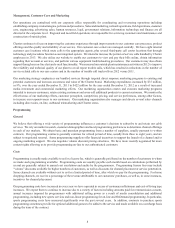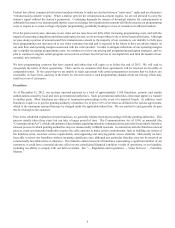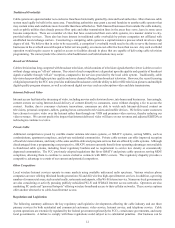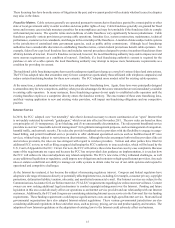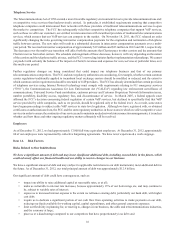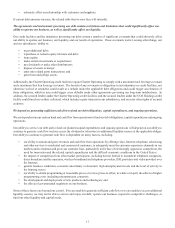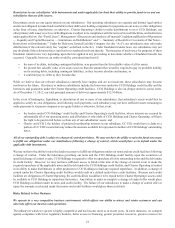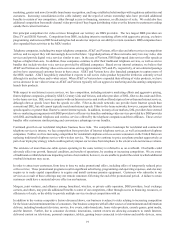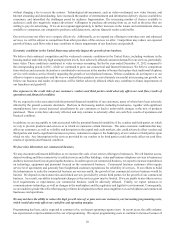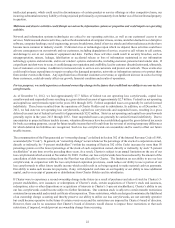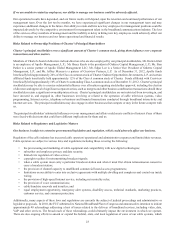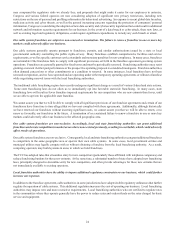Charter 2012 Annual Report Download - page 26
Download and view the complete annual report
Please find page 26 of the 2012 Charter annual report below. You can navigate through the pages in the report by either clicking on the pages listed below, or by using the keyword search tool below to find specific information within the annual report.14
cable-provided VoIP service as an unclassified service eligible for the favorable cable rate, but the issue has not been fully resolved
by the FCC, and a change in classification could adversely impact our pole attachment rates. The order allows for new penalties
in certain cases involving unauthorized attachments, but it generally strengthens the cable industry's ability to access investor-
owned utility poles on reasonable rates, terms, and conditions. Several electric utilities have, however, sought review of the new
order at the FCC and in the D.C. Circuit Court of Appeals. The outcome of these cases could impact the pole attachment rates
we pay utility companies.
Cable Equipment. In 1996, Congress enacted a statute requiring the FCC to adopt regulations designed to assure the development
of an independent retail market for “navigation devices,” such as cable set-top boxes. As a result, the FCC generally requires cable
operators to make a separate offering of security modules (i.e., a “CableCARD”) that can be used with retail navigation devices,
and to use these separate security modules even in their own set-top boxes. The FCC commenced a proceeding in 2010 to adopt
standards for a successor technology to CableCARD that would involve the development of smart video devices that are compatible
with any multichannel video programming distributor service in the United States. The FCC also adopted new rules requiring
additional support for retail navigation devices. The new rules require cable operators to allow customers to self-install
CableCARDs. They also require cable operators to provide and advertise a reasonable discount if subscribers use their own
equipment, rather than using the operator-provided equipment otherwise included in a bundled package. In January 2013, the
United States Court of Appeals for the District of Columbia vacated certain CableCARD-related rules. In connection with our
pending request for waiver to deploy set-top boxes equipped for downloadable security without a CableCARD, we have committed
to continue to support CableCARDs and to follow the CableCARD-related rules that were struck down by the Court of Appeals
for the District of Columbia. Grant of this waiver could reduce the equipment costs for the transition to all-digital.
MDUs / Inside Wiring. The FCC has adopted a series of regulations designed to spur competition to established cable operators
in MDU complexes. These regulations allow our competitors to access certain existing cable wiring inside MDUs. The FCC also
adopted regulations limiting the ability of established cable operators, like us, to enter into exclusive service contracts for MDU
complexes. In their current form, the FCC’s regulations in this area favor our competitors.
Privacy and Information Security Regulation. The Communications Act limits our ability to collect and disclose subscribers’
personally identifiable information for our video, telephone, and high-speed Internet services, as well as provides requirements
to safeguard such information. We are subject to additional federal, state, and local laws and regulations that impose additional
subscriber and employee privacy restrictions. Further, the FCC, FTC, and many states regulate and restrict the marketing practices
of cable operators, including telemarketing and online marketing efforts. Various federal agencies, including the FTC, are now
considering new restrictions affecting the use of personal and profiling data for online advertising.
Our operations are also subject to federal and state laws governing information security, including rules requiring customer
notification in the event of an information security breach. Congress is considering the adoption of new data security and
cybersecurity legislation that could result in additional network and information security requirements for our business.
Other FCC Regulatory Matters. FCC regulations cover a variety of additional areas, including, among other things: (1) equal
employment opportunity obligations; (2) customer service standards; (3) technical service standards; (4) mandatory blackouts of
certain network, syndicated and sports programming; (5) restrictions on political advertising; (6) restrictions on advertising in
children's programming; (7) closed captioning of video programming; (8) licensing of systems and facilities; (9) maintenance of
public files; (10) emergency alert systems; and (11) disability access, including new requirements governing video-description
and closed-captioning. Each of these regulations restricts our business practices to varying degrees.
It is possible that Congress or the FCC will expand or modify its regulation of cable systems in the future, and we cannot predict
at this time how that might impact our business.
Copyright. Cable systems are subject to a federal copyright compulsory license covering carriage of television and radio broadcast
signals. The possible modification or elimination of this compulsory copyright license is the subject of continuing legislative and
administrative review and could adversely affect our ability to obtain desired broadcast programming. Pursuant to the Satellite
Television Extension and Localism Act of 2010 (“STELA”), the Copyright Office, the Government Accountability Office and the
FCC all issued reports to Congress in 2011 that generally support an eventual phase-out of the compulsory licenses, although they
also acknowledge the potential adverse impact on cable subscribers and the absence of any clear marketplace alternative to the
compulsory license. If adopted, a phase-out plan could adversely affect our ability to obtain certain programming and substantially
increase our programming costs. STELA also establishes a new audit mechanism for copyright owners to review compulsory
copyright filings, which the Copyright Office is still in the process of implementing.
Copyright clearances for non-broadcast programming services are arranged through private negotiations. Cable operators also
must obtain music rights for locally originated programming and advertising from the major music performing rights organizations.


